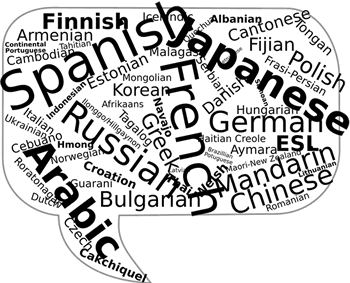by Michelle Clark

Together with growing globalization of businesses and increasingly cosmopolitan societies, the demand for job candidates with strong language skills will rise in both private and public sector. Combined with some other skills, knowledge of foreign languages can become a passport to a wealth of exciting job offers. Choosing the right language can be tough, since you usually left to pick between popular ones like French or Spanish, or those that are quite unique, such as Chinese or Russian. Which one should you choose? Read on to find out.
Before choosing a new language, you should think about your other skills and what kind of career you'll be able to launch with them. If you're interested in entering an international market scene as a businessman, naturally you should focus on languages of economies that are expected to rise.
If you're thinking about jobs that are more language-oriented, such as translator or interpreter, we've got some good news for you - the Bureau of Labor Statistics expects the market to increase by 22% between 2008 and 2018. The situation changes with new laws being passed - medical interpreters, for instance, will be in demand since health organizations and hospitals are now required to provide translation services.
All in all, knowing a less popular language might sometimes bring you more benefits than you'd ever expect. Here are two languages you might consider for your future career plans and a guide to the most profitable languages required by European companies.
Chinese economy is today one of the most dynamically developing global economies and its market attracts a lot of international companies. It's clear that in order to establish business relationships, those companies will seek the help of interpreters and translators from their home countries. OECD predicts that by 2030, China will become one of the world's largest economies, so Mandarin is a language with a lot of potential.
The beauty of Russian is that allows for easy communication with several other countries besides Russia, from Ukraine to Kazakhstan. Russia is a big market and lots of foreign companies invest in their business relationships with this giant, so if you're eying a particular one in the sector, it's worth to polish your Russian skills. It's great to have a grasp on the language during meetings, when you can detect any mistranslation and correct the interpreter's mistake or be able to handle daily communication with customers.
On the European market, English serves as lingua franca, but only in some contexts. A study conducted by the Austrian Institut für Bildungsforschung der Wirtschaft demonstrated that in order to establish business relations in Central and Eastern Europe, companies look for candidates fluent in Russian or German.
Among the top requested languages in the whole of Europe are English, Spanish, German, French and Russian. But as the market opens to new opportunities in Central and Eastern Europe, Western companies start to look for candidates who speak Czech, Hungarian, Lithuanian or Slovak. As you can imagine, together with the knowledge of such a rare language goes a hefty salary.
If you're still asking yourself whether to go for lingua franca or choose a niche language, what you need to do is a through market research - ask recruiters about the prospective language trends in sectors that interest you, have a look at what kind of job offers pop up in your area and, most importantly, choose a language that you're passionate about. This goes for any language you pick - in order to benefit from this skill in your career, you'll need to have a really good command of it.
Michelle Clark is a Project Manager at IrelandStats constantly overseeing a variety of projects in a multinational environment which allows her to
Writing systems | Language and languages | Language learning | Pronunciation | Learning vocabulary | Language acquisition | Motivation and reasons to learn languages | Arabic | Basque | Celtic languages | Chinese | English | Esperanto | French | German | Greek | Hebrew | Indonesian | Italian | Japanese | Korean | Latin | Portuguese | Russian | Sign Languages | Spanish | Swedish | Other languages | Minority and endangered languages | Constructed languages (conlangs) | Reviews of language courses and books | Language learning apps | Teaching languages | Languages and careers | Being and becoming bilingual | Language and culture | Language development and disorders | Translation and interpreting | Multilingual websites, databases and coding | History | Travel | Food | Other topics | Spoof articles | How to submit an article
[top]
You can support this site by Buying Me A Coffee, and if you like what you see on this page, you can use the buttons below to share it with people you know.

If you like this site and find it useful, you can support it by making a donation via PayPal or Patreon, or by contributing in other ways. Omniglot is how I make my living.
Note: all links on this site to Amazon.com, Amazon.co.uk
and Amazon.fr
are affiliate links. This means I earn a commission if you click on any of them and buy something. So by clicking on these links you can help to support this site.
[top]